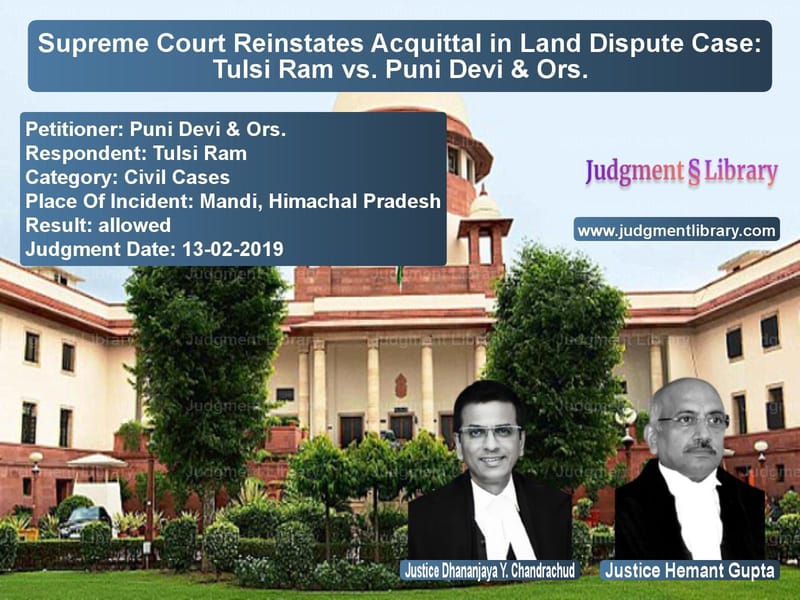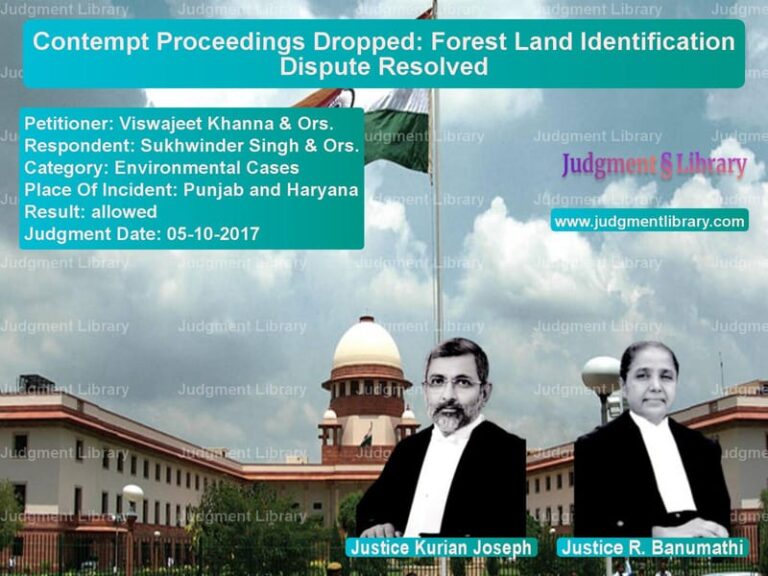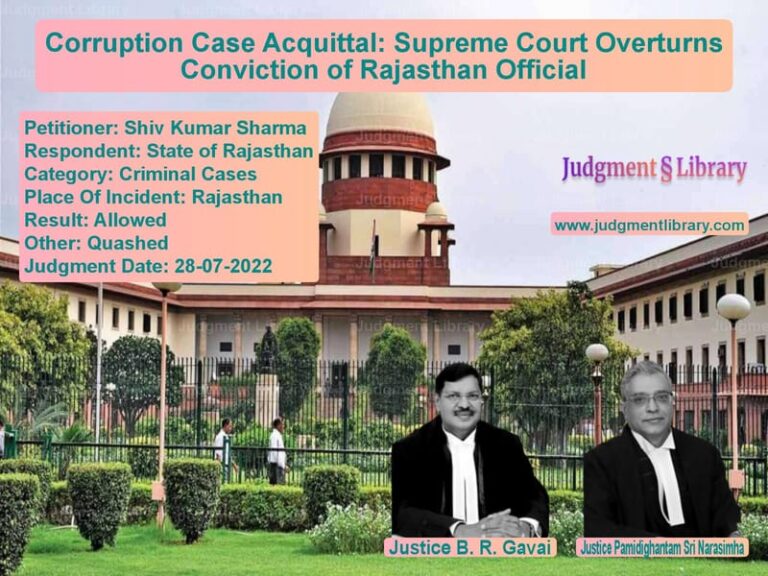Supreme Court Reinstates Acquittal in Land Dispute Case: Tulsi Ram vs. Puni Devi & Ors.
The Supreme Court of India recently delivered a judgment in the case of Puni Devi & Ors. vs. Tulsi Ram, which revolved around a dispute concerning land possession, allegations of trespass, and criminal intimidation. The case examined whether the High Court was justified in overturning a well-reasoned acquittal by the Trial Court.
Background of the Case
The case arose from a complaint filed by Tulsi Ram, who claimed to be the owner of land in Village Bataur, District Mandi, Himachal Pradesh. He alleged that on 29 March 2007, the accused, including Puni Devi and others, unlawfully entered his land, cut and removed wheat crops, and verbally abused him and his family members when they attempted to resist.
The complaint led to the registration of a criminal case under Sections 379 (theft), 427 (mischief), 447 (criminal trespass), 504 (intentional insult), and 506 (criminal intimidation) read with Section 149 of the Indian Penal Code.
Trial Court Proceedings
The case was tried before the Chief Judicial Magistrate, Mandi. The complainant, along with his daughter and son-in-law, was the primary witness in the case. The court examined the following key points:
- The complainant’s claim of ownership and possession over the land.
- Witness testimonies regarding the alleged unlawful entry and destruction of crops.
- The absence of independent witnesses from the village.
- The existence of a pending civil dispute over the same land.
The Trial Court noted several inconsistencies in the prosecution’s case. The complainant admitted that no independent witnesses were present and that he had not informed the local Panchayat about the incident. His daughter and son-in-law, who testified as prosecution witnesses, also conceded that the dispute was ongoing and that no physical assault had taken place.
Based on these findings, the Trial Court acquitted the accused, concluding that the prosecution had failed to prove its case beyond a reasonable doubt.
High Court’s Reversal of Acquittal
The complainant appealed to the Himachal Pradesh High Court, which re-evaluated the evidence and overturned the Trial Court’s decision. The High Court concluded that:
- The complainant’s testimony was credible.
- The lack of independent witnesses did not necessarily weaken the case.
- The Trial Court had erred in placing excessive reliance on minor inconsistencies.
The High Court convicted the accused, reversing the acquittal and sentencing them accordingly.
Supreme Court’s Observations
The accused challenged the High Court’s decision in the Supreme Court, which carefully analyzed the findings of both lower courts. The Supreme Court highlighted that when an appellate court reviews an acquittal, it must provide strong reasons for overturning it. The Court observed:
“The High Court was not justified in setting aside the well-considered findings of the learned Trial Judge. There is nothing in the judgment of the learned Single Judge to indicate a perversity of approach.”
“The learned Trial Judge carefully appreciated the evidence on the record. The High Court, in an appeal against acquittal, must demonstrate compelling reasons for interference, which are absent in the present case.”
Key Findings of the Supreme Court
- The High Court failed to demonstrate any legal or factual error in the Trial Court’s findings.
- The Trial Court had correctly assessed the evidence, particularly the contradictions in witness testimonies.
- The complainant had a pending civil dispute over the land, which cast doubt on the motive behind the criminal complaint.
- The absence of independent witnesses and lack of police involvement weakened the prosecution’s case.
Impact of the Judgment
The Supreme Court’s ruling has significant implications for criminal jurisprudence:
- It reinforces the principle that acquittals should not be overturned lightly.
- It underscores the importance of independent witness testimony in criminal cases.
- It highlights the need to differentiate between criminal liability and civil disputes.
Conclusion
The Supreme Court’s judgment in Puni Devi & Ors. vs. Tulsi Ram reaffirms that an acquittal cannot be reversed unless there is a clear miscarriage of justice. By setting aside the High Court’s conviction and restoring the Trial Court’s acquittal, the Court reinforced the principle that appellate courts must exercise caution while reviewing acquittals. This case serves as a significant precedent in determining the limits of judicial intervention in criminal appeals.
Petitioner Name: Puni Devi & Ors..Respondent Name: Tulsi Ram.Judgment By: Justice Dhananjaya Y. Chandrachud, Justice Hemant Gupta.Place Of Incident: Mandi, Himachal Pradesh.Judgment Date: 13-02-2019.
Don’t miss out on the full details! Download the complete judgment in PDF format below and gain valuable insights instantly!
Download Judgment: Puni Devi & Ors. vs Tulsi Ram Supreme Court of India Judgment Dated 13-02-2019.pdf
Direct Downlaod Judgment: Direct downlaod this Judgment
See all petitions in Property Disputes
See all petitions in Contract Disputes
See all petitions in Landlord-Tenant Disputes
See all petitions in Judgment by Dhananjaya Y Chandrachud
See all petitions in Judgment by Hemant Gupta
See all petitions in allowed
See all petitions in supreme court of India judgments February 2019
See all petitions in 2019 judgments
See all posts in Civil Cases Category
See all allowed petitions in Civil Cases Category
See all Dismissed petitions in Civil Cases Category
See all partially allowed petitions in Civil Cases Category







